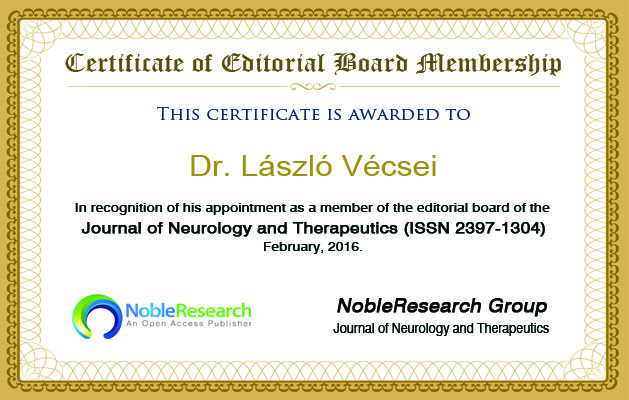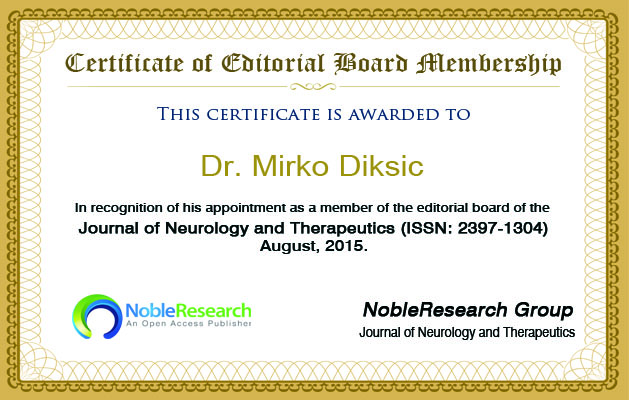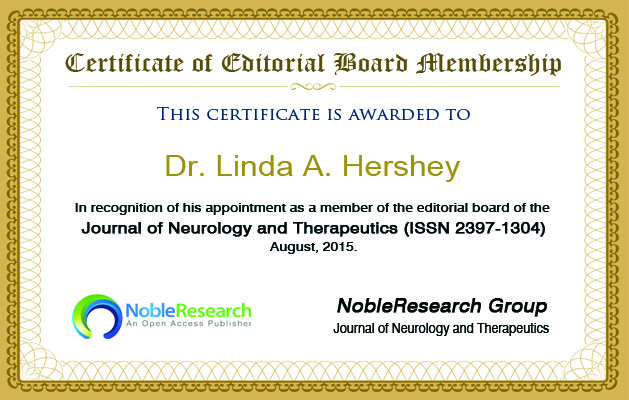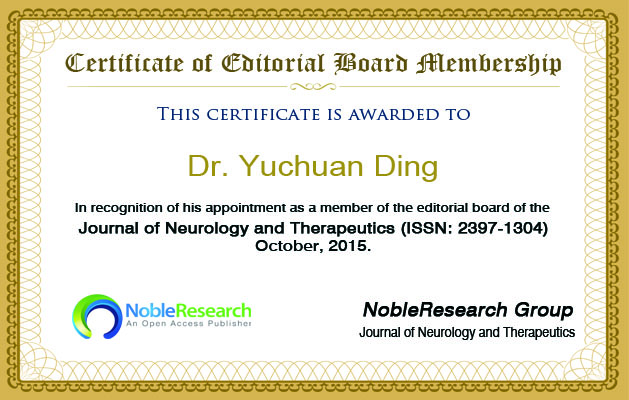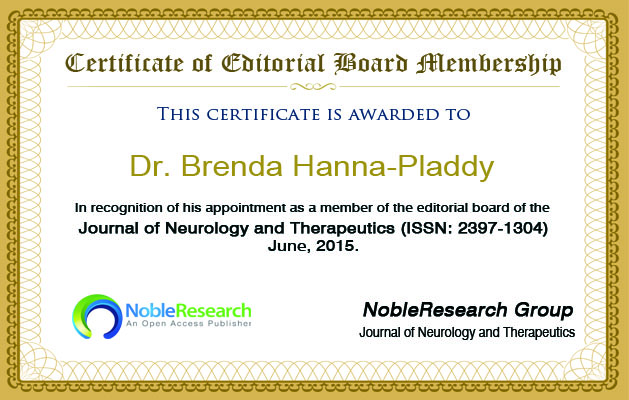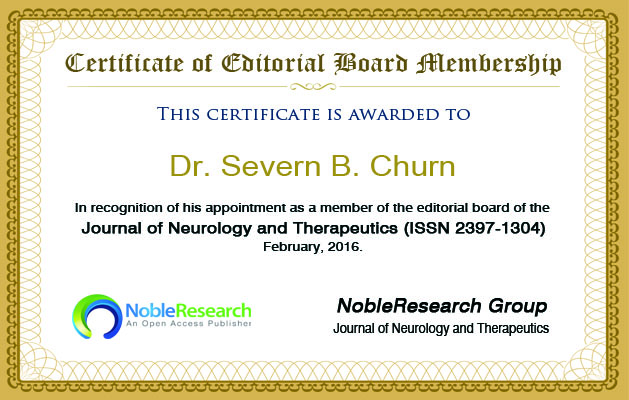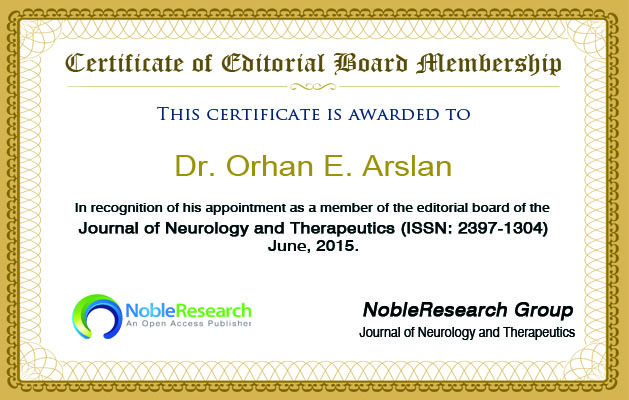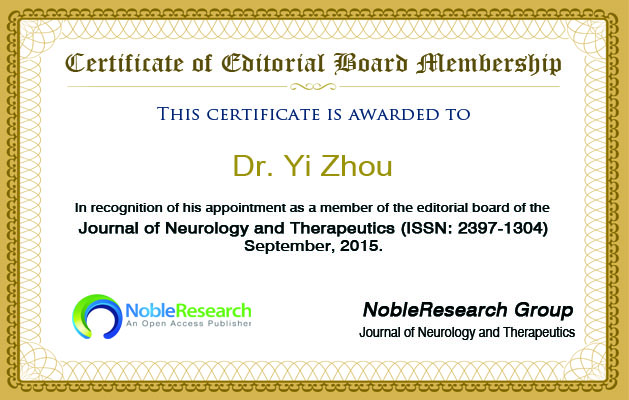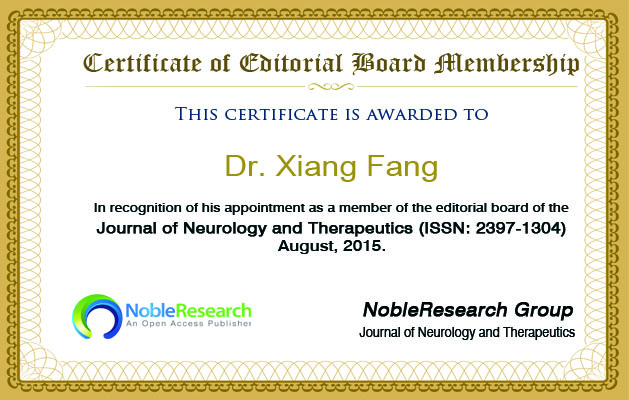
The email alerts service allows anyone who registers their email address to be notified via email when new content goes online.
Recommend this journal to your friend or library.
Manuscripts should be submitted online through our website or as an email attachment to the editorial office at editor.jnt@nobleresearch.org
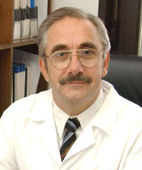
- Dr. László Vécsei,
- Professor and Director,
- Department of Neurology,
- University of Szeged,
- Albert Szent-Györgyi Medical & Pharmaceutical Center,
- Faculty of General Medicine,
- Szeged, 6701-Hungary.
- BiographyOpen or Close
Dr. László Vécsei is a Professor in the Department of Neurology, University of Szeged, Hungary. Dr. Vécsei fourty years ago started his scientific carrier in the field of neuropharmacological and behavioural investigation of different neuropeptides together with Gyula Telegdy in Szeged. They studied the effects of vasopressin on catecholaminergic system and firstly found that somatosatin facilitates learning and memory processes in rodents. Furthermore, they measured the behavioral effects of newly characterised hypothalamic neuropeptides –like H-Phe-Ile-Tyr-His-Ser-Tyr-Lys-OH- isolated by Andrew Victor Schally (Nobel Laurate, 1977). In migraine patients in collaboration with Rolf Ekman (Lund University) they measured the CSF’ concentrations of different neuropeptides like somatostatin, CGRP, beta-endorphin. Recently -in collaboration with scientists of University of Pécs- in migraine patients they found PACAP alterations during the migrainre attack. He started his work with the kynurenine system together with M. Flint Beal (Massachusetts General Hospital, Harvard Medical School, Boston) in 1989. Recently together with his colleagues in Szeged first time they published that kynurenine system may play a role in migraine. Furthermore, they patented that newly synthesized kynurenic acid analogue (SZR-72) inhibited the development of clinical symptoms in transgenic Huntington disease mice and increased their survival.
- ExpertiseOpen or Close
Dr. László Vécsei special professional interests include clinical neurology, extrapyramidal diseases, headache, multiple sclerosis, neuropharmacology, pathomechanism of neurodegeneration and the role of kynurenines
- CertificateOpen or Close
- PublicationsOpen or Close
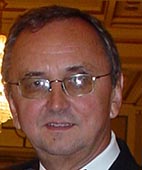
- Dr. Mirko Diksic, Professor,
- Department of Neurology and Neurosurgery,
- McGill University,
- 3801 University St. Montreal,
- Canada.
- BiographyOpen or Close
Mirko Diksic received his B.S., M.S., and Ph.D. degrees from the University of Zagreb, Zagreb, Croatia, in 1966, 1968, and 1970, respectively. From 1979 to 1991, he was an Assistant and Associate Professor (with tenure) and from 1992 to 2010, a Professor, Department of Neurology and Neurosurgery, McGill University, Montreal, QC, Canada. Since 2010, he has been a Professor Emeritus, Department of Neurology and Neurosurgery, McGill University, Montreal, QC, Canada. Moreover, he is a member of the editorial boards of several journals, an ad hoc referee for 15 journals, and a cochairman and an organizer of sessions at many international meetings. He supervised more than 40 graduate students and postgraduate fellows. His research interests include the evaluation of the brain serotonergic system in humans using positron emission tomography and in animals using autoradiography. His publications include 260 papers published in refereed journals, 280 abstracts, 149 invited lectures, and 8 review articles in refereed journals. He is a coeditor of a book.
- ExpertiseOpen or Close
A great deal of Mirko Diksic's scientific work is connected to studies in the control of the synthesis rate of the neurotransmitter (serotonin) in the CNS. Mirko Diksic is one of the first scientists to determine the rate of serotonin synthesis in the human brain in vivo, using 11C-alpha-methyltryptophan synthesized in his own laboratory. Mirko Diksic has successfully used his abundant experience in basic sciences and applied that knowledge to neurobiological and neuropharmacological research. Mirko Diksic was the first person to demonstrate that the effects of BCNU depend on its routes of administration. Using PET studies, it was determined that 11C-BCNU following intra-arterial administration accumulated in brain tumors 50% more than after intravenous administration.
- CertificateOpen or Close
- PublicationsOpen or Close
- Dr. Linda A. Hershey,
- Professor of Neurology,
- University of Oklahoma Health Sciences Center,
- Oklahoma City, OK,
- USA.
- BiographyOpen or Close
Linda Ann Hershey completed her fellowship in clinical pharmacology at University of Rochester Medical Center, Rochester, N.Y. She completed a neurology residency at Washington University School of Medicine, St. Louis, MO., where she also earned her medical degree and doctorate in pharmacology. She completed an internship at St. John's Mercy Medical Center, St. Louis, MO. Linda Ann Hershey is a board-certified neurologist who sees patients with dementia and other neurodegenerative diseases at the OU Physicians Neurology Office in Oklahoma City, OK. She teaches students and residents at the OU Health Sciences Center. She serves on the editorial board of Neurology. Hershey came to OUHSC from Buffalo, N.Y. in 2010, where she had been Chief of Neurology at the VA Western New York Healthcare System and a Professor of Neurology at the University at Buffalo School of Medicine (SUNY).
- ExpertiseOpen or Close
Linda A. Hershey current research studies are- an industry-sponsored trial of a new drug for Alzheimer’s disease, an Alzheimer’s Association-sponsored study of home-based O.T. interventions for several different dementing illnesses, a private foundation-sponsored study using the sleep lab to distinguish two subtypes of mild cognitive impairment, and a resident’s study of behavioral changes seen in two subtypes of progressive supranuclear palsy.
- CertificateOpen or Close
- PublicationsOpen or Close

- Dr. Stefan F T Weiss, Professor
- Biochemistry,
- Intellectual Property (IP) Scout (Faculty of Science),
- School of Molecular and Cell Biology (MCB),
- University of the Witwatersrand,
- Johannesburg,
- Republic of South Africa.
- BiographyOpen or Close
Professor Weiss obtained his Bachelor Degree in Biology from the University of Bielefeld, Germany in 1985. In 1988, he obtained his Master of Science in Biology from the Ruprecht-Karls-University of Heidelberg, Germany. In 1992, Professor Weiss obtained his PhD for his dissertation focusing on HIV-1 Therapeutics blocking HIV Reverse Transcriptase also from the University of Heidelberg. Between 1997 and 2001, he obtained a series of visitor fellowships from the CEA in Paris, France. In July 2009 he was appointed as Professor of Biochemistry at the Faculty of Science, School of Molecular and Cell Biology at the University of the Witwatersrand. He was awarded a B1 rating from the National Research Foundation (NRF), South Africa in January 2011. He published 42 Original Publications, 22 Review Articles, 5 book chapters, one Editorial commentary and one meeting report and has five active patents. His publications have been cited 2250 times (ISI) and he is holding an h-index of 22 (ISI). He is an Editorial Board Member of seven international peer-review Journals including Nature’s Scientific Reports, PLOS One and Journal of infectious Diseases, acts as a referee for 55 international peer-review Journals and as a reviewer for 15 research foundations. He received 3 Million Euros for his recent research from European Research Organisations and has been awarded ZAR 2.7 Million from South African Foundations (NRF and SAMRC).
- ExpertiseOpen or Close
Prof Weiss research interests concentrate on neurodegenerative diseases focusing on Alzheimer’s Disease as well as metastatic cancer aiming to identify powerful therapeutics for an effective treatment of these diseases.
- CertificateOpen or Close
- PublicationsOpen or Close

- Dr. Yuchuan Ding, Professor,
- Director of Cerebrovascular Research Labs,
- Associate Chair for Research,
- Department of Neurological Surgery,
- Wayne State University School of Medicine,
- Detroit, MI,
- USA.
- BiographyOpen or Close
Dr. Yuchuan Ding currently serves as the Director of Cerebrovascular Disease Laboratories and the Associate Chair for Research and professor in the Department of Neurological Surgery, at Wayne State University School of Medicine. Dr. Ding also holds the position of Professor at the Capital Medical University in Beijing, China, and at Weifan Medical College in Shandong, China. He received his Medical Degree at Beijing University Health Science Centre and his M.S. in Surgery at Peking Union Medical College in Beijing, China. After finishing his residency in China, Dr. Ding became an attending surgeon. Dr. Ding continued on to his Ph.D. in Developmental Neuroscience at The Australian National University in Canberra, Australia. Dr. Ding then had his postdoctoral training at Vanderbilt University Medical School in USA and proceeded to join the faculty at Wayne State University. Dr. Ding is currently a member of the American Heart Association Stroke Council, the Society for Neuroscience (USA), Plastic Surgery Research Council (USA), National Neuro trauma Society (USA), and International Society for Cerebral Blood Flow & Metabolism. His expertise as a researcher in biochemical sciences and neurosciences has led Dr. Ding to profound advances and conclusions with translational studies in stroke and traumatic brain injury. Dr. Ding has published over 120 peer-reviewed articles and numerous abstracts, as well as many book chapters.
- ExpertiseOpen or Close
Dr. Yuchuan Ding research interests includes Ischemia/reperfusion injury, Stroke therapy, Treatment and mechanisms for traumatic brain injury, Cell death, Brain oedema, Brain information, Preconditioning, Exercise, Rehabilitation, Hypothermia, Ethanol therapy, Oxygen therapy.
- CertificateOpen or Close
- PublicationsOpen or Close
- Dr. Srdjan Vlajkovic,
- Associate Professor,
- Department of Physiology,
- University of Auckland,
- Private Bag 92019,
- New Zealand.
- BiographyOpen or Close
Dr. Srdjan Vlajkovic is an Associate Professor in the Department of Physiology, University of Auckland. He completed his medical degree and doctorate in Neuroscience at the University of Belgrade. Dr Vlajkovic’s programme of research incorporates a series of projects that directly investigate the protective role of adenosine and ATP on the development of noise-induced cochlear injury and other forms of oxidative stress in the inner ear. He is leading internationally the field of adenosine signalling in the cochlea, and the translational research in this area. His research has attracted national and international funding, and has had a high impact on current understanding of the role of adenosine receptors in prevention and treatment of acquired hearing loss. He has published many research articles in peer-reviewed journals.
- ExpertiseOpen or Close
Dr. Srdjan Vlajkovic first research interest was in autoimmunity of the CNS and development of novel behavioural paradigms to study neuro-immune interactions. His principal research interest is in the field of auditory neuroscience, and he studies the cellular and molecular basis of cochlear homeostasis in conditions of stress and injury. His primary focus is on the role of oxidative stress and inflammation in the development of noise-induced and age-related hearing loss.
- CertificateOpen or Close
- PublicationsOpen or Close

- Dr. Brenda Hanna-Pladdy, Associate Professor
- Department of Neurology,
- Department of Diagnostic Radiology & Nuclear Medicine & Psychiatry,
- University of Maryland School of Medicine,
- 110 South Paca Street 3rd Floor,
- Baltimore Maryland,
- USA.
- BiographyOpen or Close
Dr. Brenda Hanna-Pladdy is Associate Professor of Neurology, Diagnostic Radiology & Nuclear Medicine & Psychiatry at the University of Maryland School of Medicine. She is a clinical neuropsychologist and a member of the Division of Movement Disorders in the Neurology Department. She obtained her Ph.D. at Louisiana State University and completed her post-doctoral fellowship in neuropsychology under the direction of Kenneth Heilman, MD in the Department of Neurology at the University of Florida McKnight Brain Institute. Prior to her current appointment at UMB, she held faculty appointments in the Department of Neurology at Emory University, Department of Psychiatry and Landon Center on Aging at University of Kansas School of Medicine, and in the Cognitive Neurology & Alzheimer’s Disease Center and Psychiatry Department of Northwestern University Feinberg School of Medicine. She is a member of several editorial boards, and serves as an ad-hoc reviewer for numerous journals and grant associations.
- ExpertiseOpen or Close
Dr. Brenda Hanna-Pladdy research program focuses on cognitive aspects of skilled movement disorders. This has included mild cognitive impairment in Parkinson's disease (PD), implicit learning, and apraxia following left hemisphere stroke. She have engaged in research regarding cognitive aspects of PD, and the neural substrates of subtypes of apraxic disturbances utilizing a combination of behavioral and neuroimaging techniques. she have conducted investigations evaluating cognitive and skilled movement deficits in PD (including executive deficits), and neural substrates evaluating dopamine with raclopride and FDG PET. Dr. Brenda Hanna-Pladdy have explored dopaminergic modulation of cognitive aspects of skill acquisition in PD, including planning and reliance on internal versus external cues. She currently have federally funded research that evaluates neuroplasticity and recovery of function following stroke, and the neural basis for a potential neurorehabilitation program utilizing multisensory cues. Her more recent work explores how training-induced musical instrumental skilled practice may enhance multisensory networks to provide compensation in advanced age.
- CertificateOpen or Close
- PublicationsOpen or Close
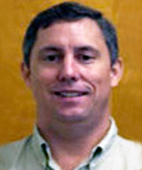
- Dr. Severn B. Churn,
- Associate Professor,
- Departments of Neurology,
- Virginia Commonwealth University,
- Room 621 Medical Sciences Building,
- 1217 East Marshall Street,
- Richmond, VA 23298-0599, USA.
- BiographyOpen or Close
Dr. Severn B. Churn is an Associate Professor in the Department of Neurology, Virginia Commonwealth University, Richmond, VA 23298-0599. He received his PhD in Pharmacology from Virginia Commonwealth University in 1991; his MS in Biology from the University of Richmond in 1986 and his BS in Biology from College of William and Mary in 1984. Dr. Churn did his Postdoctoral Fellow in the Department of Neurology at Virginia Commonwealth University. Dr. Churn is the author of more than 45 publications in peer-reviewed medical journals and he has 12 books and book chapters.
- ExpertiseOpen or Close
Dr. Severn B. Churn's primary research interests include characterizing the neuronal mechanisms that are activated following neuronal trauma and pathological excitation. Dr. Churn research foci include the electrographic characterization of both acute and chronic brain activity following status epilepticus and traumatic brain injury, and aging as well as characterizing the signaling cascades through which altered neuronal activity is modulated. His areas of expertise and interest are Signal Transduction; Status Epilepticus; ECoEG Monitoring; Neurochemistry; Neuronal Excitability; Seizure; Neurotransmission; Epileptogenesis; Traumatic Brain Injury; Phosphorylation; Epilepsy; Aging.
- CertificateOpen or Close
- PublicationsOpen or Close

- Dr. Orhan E. Arslan, Associate Professor,
- Department of Pathology and Cell Biology,
- University of South Florida Morsani College of Medicine,
- 12901 Bruce B. Downs Blvd, MDC 11,
- Tampa, FL 33612-4799, USA.
- BiographyOpen or Close
Dr. Orhan E. Arslan is an Associate Professor and the Director of Advanced Neuroanatomy and Anatomy Programs in the Department of Pathology and Cell Biology at the University of South Florida Morsani College of Medicine. He holds doctoral degrees in anatomy and neuroscience, as well as in veterinary medicine and surgery. He have successfully designed and implemented significant innovative curricular modules in clinical neuroscience and anatomy. The curricular restructuring included system-based anatomy and neuroanatomy courses and multidisciplinary board review modules that integrate neuroanatomy, anatomy, and embryology. Dr. Orhan teaching career has been distinguished with several awards, including Basic Science Professor of the Year, Dean’s Performance Award, Most Outstanding Instructor, and Golden Apple and Interprofessionalism awards, among many others, at both Rosalind Franklin University School of Medicine (RFU) and the University of South Florida Morsani College of Medicine. In recognition of his service, an Endowed Scholarship and Excellence in Anatomy awards have been established in his name. Dr. Orhan is a graduate of the Leadership Institute at the University of South Florida. He is an author of books in neuroscience that received Outstanding Academic Title Award by the Choice Magazine, Current Reviews for Academic Libraries, for excellence in scholarship and presentation, and the significant contribution to the field.
- ExpertiseOpen or Close
Dr. Orhan E. Arslan research interest revolves around three themes. Educationally related research the concentrates on curricular restructuring in medical and health related institutions, learning environment, national medical examiners. The 2nd theme is in the area of neuroscience and in particular the vestibular system, basal ganglia, motor system and visual systems. The 3rd theme is anatomical sciences including procedural anatomy and developmental basis of diseases.
- CertificateOpen or Close
- PublicationsOpen or Close
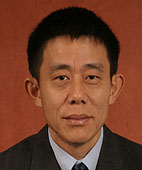
- Dr. Yi Zhou, Associate Professor,
- Department of Biomedical Sciences,
- College of Medicine,
- Florida State University ,
- Tallahassee, FL 32306,
- USA.
- BiographyOpen or Close
Dr. Yi Zhou is an Associate Professor of Biomedical Sciences at Florida State University (FSU) College of Medicine and a member of the FSU Program in Neuroscience. He obtained his Ph.D. degree in Physiology and Neuroscience at the University and Minnesota, and completed his post-doctoral fellowship under the direction of Dr. Irwin Levitan in the Volen National Center for Complex Systems at Brandeis University. Prior to his current appointment at FSU, he held faculty appointments in the Department of Neuroscience at the University of Pennsylvania, Department of Neurobiology at University of Alabama at Birmingham. He received research grants from both American Heart Association and National Institute of Health, serves as a reviewer for numerous journals and grant associations and is a member of editorial boards for a couple of journals.
- ExpertiseOpen or Close
Dr. Yi Zhou research interests are structure and function of ion channels in neurons; Signaling mechanisms in synaptic transmission and plasticity; Protein quality control in neurodegenerative diseases; Animal models of neuropsychiatric diseases.
- CertificateOpen or Close
- PublicationsOpen or Close

- Dr. Xiang Fang,
- Associate Professor of Neurology,
- Director of UHC and TDC Neurology Clinic,
- Department of Neurology ,
- The Mitchell Center for Neurodegenerative Diseases,
- University of Texas Medical Branch (UTMB),
- Galveston, TX 77555, USA.
- BiographyOpen or Close
Dr. Xiang Fang is an Associate Professor and the Medical Director of UHC and TDC Neurology Clinic in the Department of Neurology and The Mitchell Center for Neurodegenerative Diseases at the University of Texas Medical Branch. He obtained his MD, and PhD Degree in Pharmacology from Hunan Medical University in 1985, and completed his post-doctoral training under Dr. Arthur A. Spector in Department of Biochemistry, University of Iowa in 1998. He has been working in the field of lipid, peptides and glucose metabolism (PPARγ, inducible cyclooxygenase, lipid peroxidation etc), inflammation, and reactive oxygen species (ROS) for over 15 years. Currently his research focuses on 1) Alcohol-induced neurodegeneration; 2) Mitochondrial dysfunction in myotonic dystrophy type 1; 3) DNA damage triggers signal pathway in trinucleotide repeats associated neurodegenerative diseases (Huntington’s disease, SCA etc.); 4) Fatty acids and endogenous cannabinoids in CNS. He received Scientist Development Award from American Heart Association (AHA), and Physician Scientist Award (K02) from National institute of Neurological Disorders and Stroke (NINDS). He published more than 50 Original Publications, 7 Review articles. He has served as an Editorial Board Member for ten international peer-review Journals, and as a reviewer for 22 international peer-review Journals.
- ExpertiseOpen or Close
Dr. Xiang Fang research interest includes Role of PGC-1α in the pathogenesis of Myotonic dystrophy type 1 (DM1); Redox regulation and ATM signaling in DM1;Therapeutic trial of anti-oxidant therapy in DM1;Alcohol-induced mitochondrial dysfunction & neurodegeneration: Role of PGC-1alpha; DNA damage vs. repair in trinucleotide repeats ssociated neurodegenerative diseases (Huntington’s disease, SCA etc.); Fatty acids and endogenous cannabinoids in CNS.
- CertificateOpen or Close
- PublicationsOpen or Close




